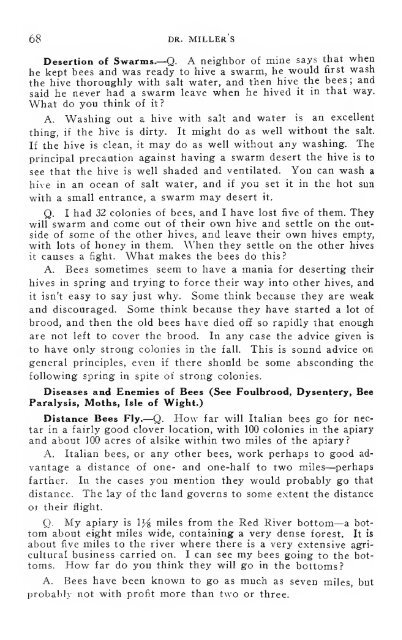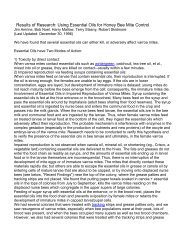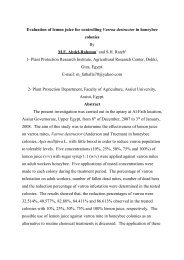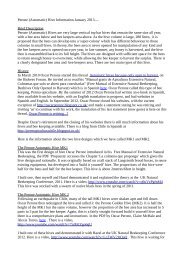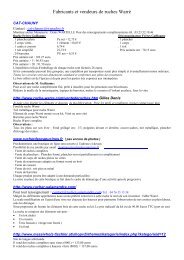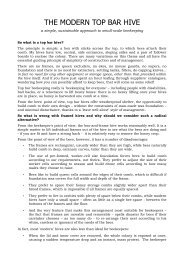- Page 3 and 4:
SF 523.M653t"""'"""""'""''* 'jiofsa
- Page 9 and 10:
A Thousand AnswersTOBeekeeping Ques
- Page 11:
INPREFACE1895 there was begun, in t
- Page 14 and 15:
I DR. MILLER Scan it be kept in an
- Page 16 and 17:
+ DR. MILLER Sthe matter of hinderi
- Page 18 and 19:
DR. MILLER Sbiting. Yet it may be w
- Page 20 and 21:
ODR. MILLER Swill be the better one
- Page 22 and 23:
10 DR. miller'sQ. How long does bas
- Page 26 and 27:
14 DR. MILLER SA. The best remedy f
- Page 28 and 29:
16 DR. MILLER Sof the moth, it's go
- Page 30 and 31: 18 DR. miller'shoney on both sides;
- Page 32 and 33: 20 DR. miller'sBeestings.—Q. If y
- Page 34 and 35: 22 DR. MILLER Sthen in the morning
- Page 37 and 38: THOUSAND ANSWERS 25Q. Which is bett
- Page 39 and 40: THOUSAND ANSWERS 27anything at repa
- Page 41 and 42: THOUSAND ANSWERS 29This swarm I cau
- Page 43 and 44: THOUSAND ANSWERS 31A. It is not adv
- Page 45 and 46: THOUSAND ANSWERS 33Q. How would it
- Page 47 and 48: THOUSAND ANSWERS 35stir two or thre
- Page 49 and 50: toTHOUSAND ANSWERS 37A. Use a solar
- Page 51 and 52: THOUSAND ANSWERS 39the larger hive
- Page 53 and 54: THOUSAND ANSWERS 41A. It ought to b
- Page 55 and 56: THOUSAND ANSWERS 43perienced at the
- Page 57 and 58: THOUSAND ANSWERS 45Cleome pungens w
- Page 59 and 60: THOUSAND ANSWERS 47mon growth. The
- Page 61 and 62: . makesTHOUSAND ANSWERS 49workers a
- Page 63 and 64: THOUSAND ANSWERS 51top ones) in sec
- Page 65 and 66: THOUSAND ANSWERS 53honey is coming
- Page 67 and 68: THOUSAND ANSWERS 55those sections a
- Page 69 and 70: THOUSAND ANSWERS 57Comb Honey.—Q.
- Page 71 and 72: THOUSAND ANSWERS 59A. I take off a
- Page 73 and 74: THOUSAND ANSWERS 61or damp room. I'
- Page 75 and 76: THOUSAND ANSWERS 63boiler or other
- Page 77 and 78: THOUSAND ANSWERS 65Q. Would you adv
- Page 79: THOUSAND ANSWERS 67frame dovetailed
- Page 83 and 84: THOUSAND ANSWERS 71drone-comb spoke
- Page 85 and 86: isisTHOUSAND ANSWERS 73A. Eggs are
- Page 87 and 88: THOUSAND ANSWERS 75A. Any time. Pre
- Page 89 and 90: THOUSAND ANSWERS 77cellared, she be
- Page 91 and 92: THOUSAND ANSWERS 79A. Not if the en
- Page 93 and 94: THOUSAND ANSWERS 81Q. Are not queen
- Page 95 and 96: THOUSAND ANSWERS 83reversible extra
- Page 97 and 98: THOUSAND ANSWERS 85it isn't likely
- Page 99 and 100: THOUSAND ANSWERS 87A. Don't transfe
- Page 101 and 102: THOUSAND ANSWERS 89weak colonies wi
- Page 103 and 104: THOUSAND ANSWERS'91A. I have used b
- Page 105 and 106: THOUSAND ANSWERS93Q. What is the co
- Page 107 and 108: THOUSAND ANSWERS 95i. e.,_ those sh
- Page 109 and 110: THOUSAND ANSWERS 97A. The unsealed
- Page 111 and 112: THOUSAND ANSWERS 99healthy which ha
- Page 113 and 114: THOUSAND ANSWERS 101Q. Which frame
- Page 115 and 116: THOUSAND ANSWERS 103I believe frame
- Page 117 and 118: THOUSAND ANSWERS 105A. Your plan wi
- Page 119 and 120: THOUSAND ANSWERS 107weather being d
- Page 121 and 122: THOUSAND ANSWERS 109must be stamped
- Page 123 and 124: THOUSAND ANSWERS 111granulate as so
- Page 125 and 126: THOUSAND ANSWERS 113Q. How long is
- Page 127 and 128: THOUSAND ANSWERS 115but, as the dry
- Page 129 and 130: . theyTHOUSAND ANSWERS 117A. The nu
- Page 131 and 132:
THOUSAND ANSWERS 119Q. Kindly give
- Page 133 and 134:
THOUSAND ANSWERS 121Holy Land Bees.
- Page 135 and 136:
THOUSAND ANSWERS 123and end of the
- Page 137 and 138:
THOUSAND ANSWERS 125"Take off each
- Page 139 and 140:
THOUSAND ANSWERS 127captured the re
- Page 141 and 142:
THOUSAND ANSWERS 129seemed to be st
- Page 143 and 144:
THOUSAND ANSWERS 131to your other h
- Page 145 and 146:
THOUSAND ANSWERS 133queen and leavi
- Page 147 and 148:
THOUSAND ANSWERS 135of my bees. I w
- Page 149 and 150:
THOUSAND ANSWERS 137The earlier you
- Page 151 and 152:
THOUSAND ANSWERS 139than ten days
- Page 153 and 154:
THOUSAND ANSWERS 141prefer those wh
- Page 155 and 156:
THOUSAND ANSWERS 143Laws on Beekeep
- Page 157 and 158:
THOUSAND ANSWERS 145clined to put i
- Page 159 and 160:
THOUSAND ANSWERS 147Q. Will hen lic
- Page 161 and 162:
THOUSAND ANSWERS 149two miles—dis
- Page 163 and 164:
THOUSAND ANSWERS15 itrance closed w
- Page 165 and 166:
THOUSAND ANSWERS 153there will be n
- Page 167 and 168:
THOUSAND AxXSWERS 155A. For more th
- Page 169 and 170:
THOUSAND ANSWERS 157giving a pound
- Page 171 and 172:
THOUSAND ANSWERS 159continued throu
- Page 173 and 174:
THOUSAND ANSWERS 161A. I have been
- Page 175 and 176:
THOUSAND ANSWERS 163will last longe
- Page 177 and 178:
THOUSAND ANSWERS 165the meal down l
- Page 179 and 180:
THOUSAND ANSWERS 167Q. How can I re
- Page 181 and 182:
THOUSAND ANSWERS 169with a select t
- Page 183 and 184:
THOUSAND ANSWERS ]71tance, for if h
- Page 185 and 186:
THOUSAND ANSWERS 173can feed her, s
- Page 187 and 188:
THOUSAND ANSWERS 175when the swarm
- Page 189 and 190:
. youTHOUSAND ANSWERS 177swarming,
- Page 191 and 192:
THOUSAND ANSWERS 179worker), and in
- Page 193 and 194:
THOUSAND ANSWERS 181smoke—because
- Page 195 and 196:
THOUSAND ANSWERS 183den under a mas
- Page 197 and 198:
THOUSAND ANSWERS 185Put in the cell
- Page 199 and 200:
THOUSAND ANSWERS 187would not hold
- Page 201 and 202:
THOUSAND ANSWERS 189try again. At a
- Page 203 and 204:
THOUSAND ANSWERS 191locality that p
- Page 205 and 206:
THOUSAND ANSWERS 193A. A virgin que
- Page 207 and 208:
THOUSAND ANSWERS 195said, the bees
- Page 209 and 210:
THOUSAND ANSWERS 197Queenlessness.
- Page 211 and 212:
THOUSAND ANSWERS 199brood Xovember
- Page 213 and 214:
THOUSAND ANSWERS 201that you should
- Page 215 and 216:
THOUSAND ANSWERS 203from the field.
- Page 217 and 218:
THOUSAND ANSWERS 205Generally robbi
- Page 219 and 220:
THOUSAND ANSWERS 207Royal Jelly.—
- Page 221 and 222:
THOUSAND ANSWERS 209without danger
- Page 223 and 224:
THOUSAND ANSWERS 211ceed. The way y
- Page 225 and 226:
THOUSAND ANSWERS 213If the bees can
- Page 227 and 228:
THOUSAND ANSWERS 215bees must be le
- Page 229 and 230:
THOUSAND ANSWERS 217Q. I want to ta
- Page 231 and 232:
THOUSAND ANSWERS 219A. Maybe one sm
- Page 233 and 234:
THOUSAND ANSWERS 221ger of smotheri
- Page 235 and 236:
THOUSAND ANSWERS 223be better to ha
- Page 237 and 238:
THOUSAND ANSWERS 225How thin a suga
- Page 239 and 240:
THOUSAND ANSWERS 227to work you may
- Page 241 and 242:
THOUSAN'D AXSXAERS 229pen that the
- Page 243 and 244:
THOUSAND ANSWERS 231A. A 'T" super
- Page 245 and 246:
THOUSAND ANSWERS 233allow a quarter
- Page 247 and 248:
THOUSAND ANSWERS 235A. In the prope
- Page 249 and 250:
THOUSAND ANSWERS^237cell looked jus
- Page 251 and 252:
THOUSAND ANSWERS 239method with one
- Page 253 and 254:
THOUSAND ANSWERS 241Q. I would like
- Page 255 and 256:
THOUSAND ANSWERS 243and generally m
- Page 257 and 258:
THOUSAND ANSWERS 245A. Set the hive
- Page 259 and 260:
THOUSAND ANSWERS 247but a clean hiv
- Page 261 and 262:
Q. "If a swarm in JulyIs not worth
- Page 263 and 264:
THOUSAND ANSWERS 251winter stores?
- Page 265 and 266:
THOUSAND ANSWERS_'1,1get a few quee
- Page 267 and 268:
THOUSAND ANSWERS 255the first frame
- Page 269 and 270:
THOUSAND ANSWERS 257O. How will it
- Page 271 and 272:
THOUSAND ANSWERS 259let a bee throu
- Page 273 and 274:
THOUSAND ANSWERS 261any change when
- Page 275 and 276:
THOUSAND ANSWERS 263Will not drink
- Page 277 and 278:
THOUSAND ANSWERS 265Q. If you shoul
- Page 279 and 280:
THOUSAND ANSWERS 267walls IS genera
- Page 281 and 282:
THOUSAND ANSWERS 269from honeydew.
- Page 283 and 284:
THOUSAND ANSWERS 271A. I never trie
- Page 285 and 286:
THOUSAND ANSWERS 273cession fit to
- Page 287 and 288:
THOUSAND ANSWERS 275emptying one si


